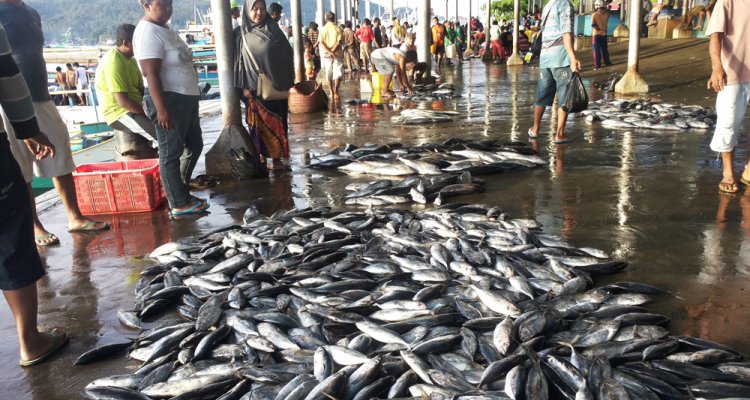
Press release
Projects for sustainable fishing not effective enough
Projects that stimulate sustainable fishing in developing countries often get no further than good intentions. Thus, some of the imported fish sold in European and North American shops may be less sustainably caught than claims suggest. To prevent the MSC quality label for sustainable fish catches being undermined, the requirements for market access should be made more exacting, argue Simon Bush from Wageningen University and his international colleagues in an article in Science published on 1 May.
Photo top right: Tuna trade in the harbour of Bitung, Sulawesi, Indonesia (photographer: Simon Bush)
Demand for seafood has doubled worldwide over the last forty years. To maintain fish stocks, large supermarket chains in Europe and North America – for example Walmart in the US and Carrefour in France – promised some years ago to sell only fresh and frozen fish from certified and sustainable sources by 2015. Even then it was clear there were insufficient supplies worldwide of caught and farmed fish with a sustainability certificate.
Stimulating sustainability
In order to increase the supply of sustainably produced fish, buyers, NGOs and governments have set up ‘fishery improvement projects’ (FIPs), which aim to increase the volume of fish certified as sustainable by the Marine Stewardship Council (MSC) Of all the fish traded internationally, approximately a half comes from developing countries. But only 7% of production from developing countries is certified by the MSC. Buyers and others involved in fishery improvement projects collaborate with fishermen and fishing organisations and contribute financially to the process of achieving MSC certification. By buying fish from fishers involved in FIPs, these buyers hope to motivate continued progress towards sustainability.
The study found that half of the 130 fishery improvement projects reviewed by the researchers, come from developing countries. Of these, two thirds fail to make further changes once they receive market access. By selling fish from these fisheries retailers not only risk stalling progress towards sustainable fisheries production, but also misleading consumers.
Conditional market access
There are no unequivocal guidelines for evaluating progress made in fishery projects, Bush said. “In fact there are no completely independent organisations currently checking whether these projects have fulfilled their expectations and taking the necessary steps have been taken to apply for MSC certification. Without such oversight, and clear conditionality on measurable improvements in return for market access, the risk of continued overfishing will remain”.
The authors point out that if agreed objectives within these projects are not met within a certain period, the possibilities for selling the fish should be restricted. They also suggest that catch permits for certain fish stocks or fishing areas should be introduced even if this is difficult to organise; if market access is not controlled, the desire for sustainable fish catches will lead to overfishing.
Finally, fishery improvement projects should pay more attention to the social-economic system in which they are undertaken. As Bush said, “We don’t know whether the market really is a true pull factor for changing fishing practices, who derives benefits from these projects, or how people can pay for potentially higher costs of sustainable fishing. This kind of information is fundamental to the success of FIPs over the long term.”
Publication
Secure Sustainable Seafood from Developing Countries. Science vol 348 issue 6234 504-506 doi: 10.1126/science.aaa4639